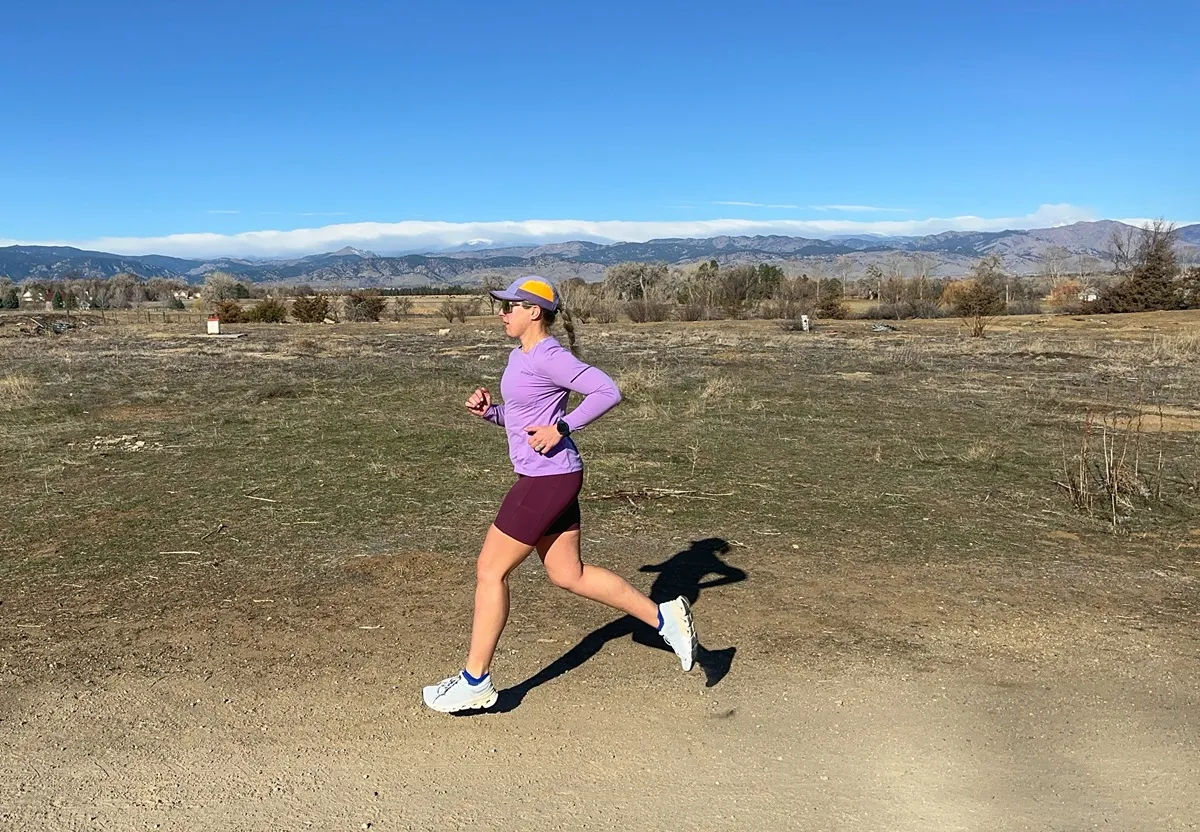You’ve spent the last several months training, then one day during the taper, you wake up achy with a stuffy nose and scratchy throat. Yep, getting sick before a race is just about every runner’s worst nightmare.
 Before you spiral into a panic or go down a never ending Dr. Google search, take a deep breath. You may have done everything like you were supposed to, but getting sick right before a race is surprisingly common.
Before you spiral into a panic or go down a never ending Dr. Google search, take a deep breath. You may have done everything like you were supposed to, but getting sick right before a race is surprisingly common.
It’s so common that it actually has a name, “the runner’s flu”.
At least, that’s what Coach Amanda has taken to calling it over the last decade of seeing it happen so frequently.
Let’s talk about why it happens, tips to feel better, and when it’s actually smarter not to toe the starting line.
Why Do Runners Get Sick Before Race Day?
The marathon taper is supposed to be when you take things easy and mentally prepare for race day. So why does your body decide that now is a good time to feel like trash?
During your peak training weeks, you’re logging lots of miles, pushing hard, and managing higher levels of stress. Your body is running off adrenaline, which helps you power through but also suppresses your immune system.
Then the taper enters the chat. Your training backs off, adrenaline drops, and suddenly your immune system comes rushing back.
But your body realizes there are germs it should’ve been fighting off for the last couple of weeks. That’s when the “runner’s flu” kicks in. You might feel just blah all over with a stuffy nose, sore throat or just achy.
A study of over 7,000 distance runners found that 1 in 13 reported systemic symptoms, like fatigue, fever, or muscle aches, in the 8 to 12 days leading up to a race. Those runners were less likely to finish the race.
Another study found that runners experienced more infectious episodes (like colds and respiratory illnesses) both before and after a race. Your immune system may be taking hits on either side of the start line.
The shift from lots of adrenaline, plus race nerves and a change in routine, can trigger the “runner’s flu”.
Do the one thing that runners struggle with- listen to your body. If it’s telling you to slow down, do it. Taking a few days of rest isn’t going to sabotage all of the hard training you’ve put in! We promise!!
5 Tips To Feel Better Before Race Day
There’s no magic wand or special supplement that you can take to prevent the runner’s flu from happening. But here are a few things that you can do to get back to feeling like yourself before race day.
One mental shift we often share is that this could be exactly what you need to ENFORCE rest and truly be recovered to hit the starting line.
#1 Prioritize Rest
You’re not going to lose fitness if you take a few extra rest days before your race. Take the naps, sleep in, go to bed early, whatever it takes!
Those runs that are on your schedule during the taper are indeed useful to keep you from feeling flat. But they only work if you’re in good health. Forcing them to happen when you should be resting will have the opposite impact.
Give your body the sleep that it needs. You should aim for getting a minimum of 6 hours, and it’s even better if you can get 8-9 hours!
Yes, you need it when you’re sick, but you also need LOTS when you’re trying to keep your immune system strong to prevent getting sick. If you think you don’t have time for a full night of sleep, well we get it.
But you’ve said this race is a big goal and you’ve put in months of work, why sabotage it now?

If you’re tracking your heart rate variability (HRV) on your GPS watch, now’s the time to start paying close attention. HRV tends to drop when your body is under stress, whether from illness, fatigue, or poor sleep. A consistently low HRV is your cue to go into full recovery mode.
#2 Stay Hydrated
Who else remembers being sick as a kid and getting handed a glass of Gatorade or Pedialyte like it was liquid gold? Turns out, they were onto something.
Doesn’t matter how old you are, when you’re sick, hydration still matters. A lot. Especially if you’re dealing with a fever, congestion, or just feeling yuck, your body’s losing fluids faster than usual. Water is great, but adding electrolytes or anything with Vitamin C is just going to help shorten the amount of time we’re sick.
You may not want to, but keep taking sips throughout the day to help your immune system get what it needs.
#3 Don’t Skip on Nutrition
When you’re feeling crummy, it’s easy to just eat toast and crackers. Maybe some Jello if you’re really living large. But unless you’re battling stomach issues, now is not the time to go light on food, especially if you’re gearing up for a longer race.
Your immune system is working overtime, and it needs backup. That means real food like fruits, veggies, protein, and yes, carbs…..all the carbs! Even if your mileage is lower during taper, your body is still prepping for race day. Skimping on carbs now means you may risk hitting that wall.
Foods like pasta might not sound super appealing when you’re feeling off. But your muscles still need that glycogen to power through.
Fuel like you’re still planning to show up for race day because it’s likely that you’re going to get over this runner’s flu.
#4 Use the “Neck Rule”
If you experience symptoms solely above your neck, you most likely have a head cold along with a blocked or runny nose, a headache, and sneezing.
Running is unlikely to aggravate these symptoms, as long as:
- you take it slow
- stick to easy training sessions
- watch your HR and if it’s higher than normal switch to a walk or rest day
- if you notice that your symptoms are getting worse time to stop
- if you notice that your energy the rest of the day is really poor, time to stop
Anything below the neck is indicative of a more serious illness, and the only way to treat it is to rest until the symptoms subside. Especially because jostling is gong to make it all feel worse.
If you have symptoms below the neck such as chest congestion, coughing, body aches, fever, vomiting, diarrhea, or severe muscular ache, discontinue running until your symptoms resolve.
See how you feel if you go for your shakeout run. If your body is still feeling drained, you may want to rethink your race day plans. Depending on the distance, it’s not worth it to slog through 13.1 or even 26.2 miles.
#5 Lower Your Stress
Being anxious or stressed about a race is completely normal and expected. When you’re anxious or stressed, your cortisol levels go up, and that can suppress your immune system just enough to let the runner’s flu sneak in.
Now’s the time to lower that stress (yep, easier said than done). But truly, the hard work is done. Remind yourself that “the hay is in the barn”. Your only job now is to rest, recover, and get excited for race day.
Use that nervous energy in a way that helps you feel prepared, like laying out your gear, making your playlist, or starting to pack if you’re heading on a racecation. Just don’t go overboard and decide now’s the time to spring clean your entire house.
If you’re still freaking out about potentially not having the race day you’ve planned for, here’s a quick rundown of how to deal with the runner’s flu from Coach Amanda.
When Are You Too Sick to Race
The big race that you’ve been working up to for months now is a few days away and your body is still not feeling 100%.
How do you know if you should push through or take a DNS (did not start)?
If you’re just blowing snot rockets and maybe a little coughing, then go for it. Run your race as hard as you want.
But if you have any of the following, you may want to call in a DNS:
- Bathroom issues persisting that are causing both discomfort and dehydration.
- Fever is more frequently a sign of an infection developing. If you haven’t been fever-free for at least 48 hours, avoid intense sessions and racing.
- Dizziness can develop for a variety of reasons, ranging from a dip in blood pressure to a middle ear infection. Regardless of the cause, running may not be safe if your balance is impaired. Utilize your best judgment and consult a physician if symptoms do not improve.
- If congestion is severe enough that it considerably impairs your ability to breathe. You should discontinue exercise if you are gasping for air or feeling lightheaded.
- Your HRV is still low and hasn’t improved at all, this is a sign your body is still fighting off something.
Remember, there are many races, but you only have 1 body. If you decide to still put in an all-out effort, you could make yourself feel even worse, sidelining you from what you love doing. That means you could go weeks or even months without being able to run or work out.
Ignore what you see on social media about sucking it up and racing while sick. There will always be another start line.
If you do decide to skip the race, your training is not lost! Depending on your recovery you might be able to find a race within the next 4-6 weeks and just small spin up then taper will get you to the starting line in good shape.
We hope that this helps answer your questions about what to do if you’re sick before your race.



 Average Mile Time for Runners: What’s Normal and What’s Impressive?
Average Mile Time for Runners: What’s Normal and What’s Impressive?
